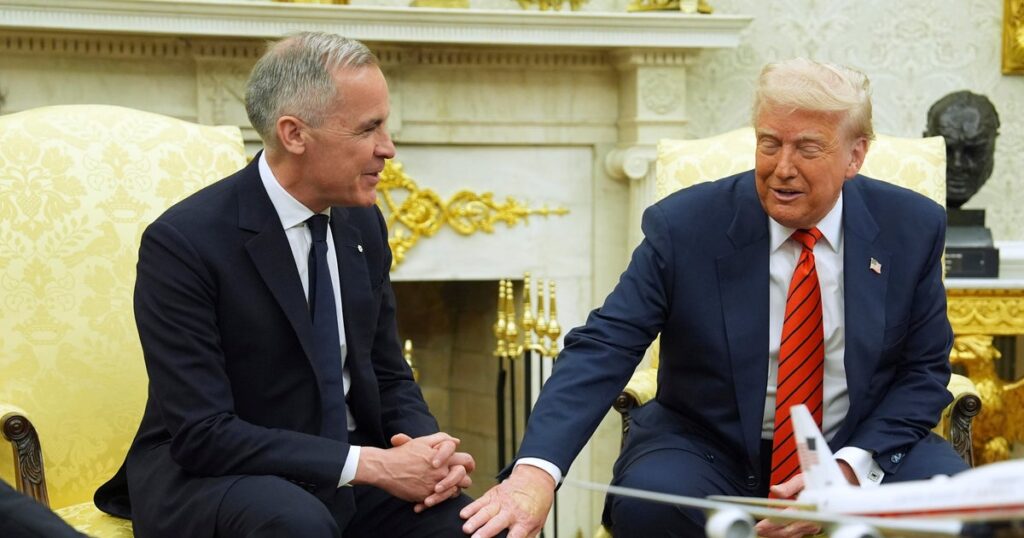Canadian Prime Minister Mark Carney said emphatically Tuesday that Canada is “not for sale” and “won’t be for sale, ever” in an Oval Office meeting with President Trump, moments after Mr. Trump called the border between the U.S. and Canada “artificial” and romanticized the idea of Canada joining the U.S.
Mr. Trump said he and Carney wouldn’t be discussing the U.S. acquiring Canada unless “somebody wants to discuss it,” but said there would be “tremendous” benefits to Canada in the event of a “wonderful marriage” between the two countries. The president has repeatedly floated the idea of acquiring Canada, despite Canada’s repeated rejection of the concept. Tuesday’s meeting at the White House was the first one they two leaders have had since Carney’s Liberal Party was victorious in last week’s federal election.
“As a real estate developer, you know, I’m a real estate developer at heart,” Mr. Trump told reporters in the Oval Office. “When you get rid of that artificially drawn line … when you look at that beautiful formation when it’s together, I’m a very artistic person.”
Carney interjected, adopting language he believed Mr. Trump would understand.
“As you know from real estate, there are some places that are never for sale,” Carney said. “We’re sitting in one right now, Buckingham Palace that you visited, as well. And having met with the owners of Canada over the course of the campaign the last several months, it’s not for sale, it won’t be for sale, ever. But the opportunity is in the partnership and what we can build together.”
Asked if Carney’s rejection of the idea makes trade and other negotiations more difficult, Mr. Trump insisted, “no, not at all.” But the U.S. president isn’t giving up on the idea, despite a lack of buy-in from Canada’s leadership and people. “But I say, ‘never say never,'” Mr. Trump said.
Carney, who has pledged to stand firm against the U.S. president, despite tensions on trade and borders, told reporters after the meeting that he asked Mr. Trump to stop calling Canada the 51st state.
Mr. Trump began their meeting in the Oval Office by congratulating Carney on his victory, saying, “I think I was probably the greatest thing that happened to him.”
“We’re gonna be friends with Canada,” the president told reporters in the Oval Office. “Regardless of anything, we’re going to be friends with Canada.”
On trade, Mr. Trump insisted there is nothing Carney could say Tuesday to lift U.S. tariffs on Canadian goods. Carney called that a “bigger discussion.”
After the White House meeting concluded, Carney told reporters at a press conference at the Canadian embassy in Washington that trade discussions will continue, and he cautioned not to expect confirmation of areas of progress until a deal is reached. Carney said Canada and the U.S. are having very “complex” negotiations about a “wide range of issues.”
“We had what I would describe as wide-ranging, and as I said a moment ago, very constructive discussions,” Carney told reporters. “We agreed to have further conversations in the coming weeks and we are looking forward to meeting in person at the G7 summit in Kananaskis, Alberta. Now, while that’s going on, in Canada, we will focus on what we can control.”
The Canadian prime minister said Canadians have more work to do in making the case that the Trump administration’s tariffs aren’t good for American jobs, or the American economy.
The Canadian prime minister, without going into detail, said the two leaders also discussed global issues of common concern, which he called the sign of a “healthy” relationship.
But U.S.-Canada relations have been strained by Mr. Trump’s tariffs and his comments about making Canada the 51st state.
Carney said in his victory speech that Canada’s previous relationship with the U.S., “based on deepening integration of our economies and tight security and military cooperation, is over.” He also said Canadians must “fundamentally reimagine our economy” in light of Mr. Trump’s tariff regime.
Ahead of the meeting, Carney told the BBC last week that Canada would only enter trade and security talks with the Trump administration “on our terms.” Carney, a member of the Liberal Party, was elected party leader in March and became the prime minister soon after.
A 25% import tariff on goods from Canada not covered by the USMCA trade agreement went into effect March 4. Mr. Trump said that tariff was to punish Canada for the entrance of fentanyl and migrants into the U.S. Last year, U.S. Customs and Border Protection seized 43 pounds of fentanyl at the Canadian border, while over 21,000 pounds of the drug was seized at the southern border. Canada retaliated against the U.S. with tariffs on many U.S. goods.
“We don’t need their Cars, we don’t need their Energy, we don’t need their Lumber, we don’t need ANYTHING they have, other than their friendship, which hopefully we will always maintain,” Mr. Trump wrote on social media ahead of Carney’s arrival. “They, on the other hand, need EVERYTHING from us!”
Over the weekend, Mr. Trump said he’d talk about making Canada the 51st state, although he said he doesn’t expect to use military force. “I don’t see it with Canada. I just don’t see it,” the president said in an interview on NBC News’ “Meet the Press.”
https://www.cbsnews.com/news/trump-mark-carney-canada-meeting/


